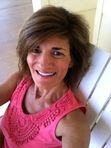Julie Musil's Blog, page 3
May 6, 2015
Invest in What Really Matters #IWSG
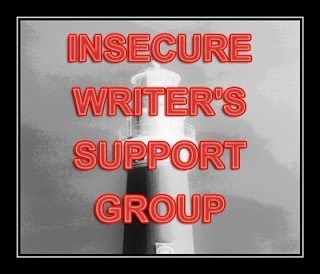
Welcome, Insecure Writers! If you haven't yet joined this group, do it here. This group, created by Alex J. Cavanaugh, is such a valuable community.
As a mom of three teen sons--one a high school senior who's heading off to college this August *wipes tears*--I have a wistful perspective on family, writing, and publishing.
Invest in what really matters.
Yes, the written word matters. Yes, pursuing our publishing dream matters. But nothing, nothing, should take the place of time spent the people who matter most.
I used to pursue writing skills and the publishing path with a vigor and passion that sometimes bordered on unhealthy. I soon realized that writing, or publishing, or sales numbers don't matter much if my family isn't at the top of my priority list. I vowed to write and work on the business side of publishing only while my kids are at school or otherwise occupied. Manuscripts can wait...family shouldn't have to.
As my son prepares to graduate from high school, I'm especially nostalgic. One thing I know for sure: I won't have regrets about the amount of time I've spent with him.
Let's write, let's publish, and let's invest in what really matters: the people we love.
Have your priorities ever gone off kilter? If you have kids, how do you prioritize them while also scheduling writing time? If you've had teens leave for college, any advice you can offer this soon-to-be-crazy-sad mom?
Published on May 06, 2015 04:00
April 29, 2015
How Penniless Writers Can Indie Publish
 (photo credit)
(photo credit)Indie publishing has become a lucrative business for many authors, and those authors mostly say the same thing--we must invest in our books in order to put the best product on the market. That initial investment can gobble up hundreds, or even thousands, of dollars.
What's a broke writer to do?
I have a few ideas. Before I get started, let's keep in mind that writers can throw unlimited dollars at marketing (swag, blog tours, ads, etc.), but I'm going to focus on the two areas where I think the initial investment is crucial: editing and cover design.
I also want to point out that publishing on all the ebook retailers is FREE. There is no cost at all to upload our manuscripts to Amazon, Barnes and Noble, Kobo, Smashwords, Apple iTunes, and CreateSpace. Zilch. The main costs involved with indie publishing are related to getting your manuscript worthy of publication, in order to put your best foot forward in a crowded market. Let's focus on a polished manuscript with a striking cover.
Now that we've established all of that, here are some ideas for penniless writers who wish to indie publish:
Trade Manuscripts With Writers in the Same Position
We hear this all the time, right? That's because it's the best (and cheapest) way to improve your work. There is no sense in paying for a freelance editor before your manuscript has been vetted by other authors. You'd just be paying for work that should've been done before the professional editor put eyes to paper. So why not use multiple rounds of beta readers?
You may be thinking, "How can I beta read or edit when I need so much help myself?" or, "All the other authors out there are higher in their skill level than me." First of all, that's not true. And even if it were true, so what? You're a reader, aren't you? That means you know what to expect in a story. You know what does and doesn't look right when it comes to grammar.
Join a writer's group on Facebook, or join a forum, and inquire about exchanging beta reads. Read the other writer's work as if you've borrowed that book from a library. Make note of anything that stands out to you.
Offer Your Services to Freelance Editors or Cover Designers
We all have unique skills. Are you great at math? Does an editor's son or daughter need tutoring? Trade services. Are you a plumber, and a cover designer needs a new faucet installed? Trade services. Is there a local editor or cover designer who has small children and would do anything for a date night? Offer to babysit for a few nights. You do have something to offer. Think about how you can help someone else.
Contact Local High Schools and Colleges
Are there students who are looking to practice their intended vocation or expand on a hobby? Beauty schools and massage schools do this sort of thing...they practice their craft on people who are willing to give them a chance. Is there an English major who'd be willing to edit your manuscript? Or a would-be graphics designer who'd like to dabble in cover design, and needs a launch project?
Free Software
Canva.com is an excellent tool for free cover designs. There's also free manuscript editing software, such as AutoCrit.com. I haven't used AutoCrit yet, but I plan on playing with it before sending my next manuscript off to the freelance editor.
If your low bank balance is what's keeping you from indie publishing, think creatively about how you can use your own time and skills to take that leap.
The help is out there...for free. The resources are out there...for free. Know what else is free? Determination. If you have the will, there's a way--even if you're broke.
Do you have other ideas for how penniless writers can move forward in their writing journeys? Please share!
Published on April 29, 2015 04:00
April 22, 2015
Imperfect Action Trumps Perfect Inaction
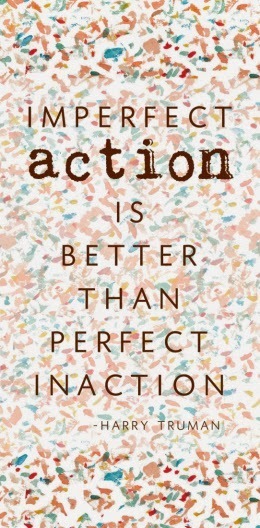 (photo credit)
(photo credit)Many of you have probably heard the Harry Truman quote, "Imperfect action is better than perfect inaction." I love this quote because it reminds us to do.
Sometimes we writers spend too much time on the sidelines, gathering information. That's great for building a strong background in writing and honing our skills, but at some point we need to stop thinking about what we should do and actually do it.
Does this sound familiar to you?
I'll read one more craft book before I actually start writing my book.I can't move on to the next chapter of draft one until the opening fifty pages are perfect.I must attend one more conference/workshop/schmooze before I'll submit my manuscript.My manuscript is ready to go, but I'm waiting for the perfect time before I query.I've queried 20 agents without an offer of representation, so I'm tabling this manuscript.I'd like to indie publish, but I must sign up X number of people to my newsletter and X number of people to my Facebook page before I take that leap.I can't write the next story until this manuscript is sold.Sometimes we wait on the sidelines because of fear. Believe me, I get it. I'm fearful as heck. But if we wait around for the publishing/agent search/indie climate to be perfect, we'll be frozen with inaction. It's better to get out there, make mistakes, fall on our faces, and get back up. At least then we're doing something.
Let's not wait for perfect inaction. Let's take imperfect action.
Do you wait for the perfect climate before taking action? Are you sometimes frozen with fear? How do you press forward?
Published on April 22, 2015 04:00
April 15, 2015
Series? Stand Alone Books? What Should You Write? Guest Post by Alex J. Cavanaugh

Guys! Today we have a super star in our midst! Alex J. Cavanaugh, the Ninja Captain himself, is here to help us understand the differences between a series and standalone books. Don't forget to check out his latest release, Dragon of the Stars.
Take it away, Alex!
The Differences Between a Series and a Stand Alone Book
Thank you for having me today, Julie!
What is the difference between a series and a standalone book? Which is better? Now that I have written both, I can offer some tips. (Although technically, I have written two standalone books, as I never intended to write a sequel to my first book.) There is a distinct difference and advantages to both.
Let me show you advantages and disadvantages:
Series –
Disadvantages:
Making the following stories fresh and newKeeping the timeline and details straightMaintaining excitement throughout the series
Advantages:
Characters and world are familiarBuilt in fan baseCan expand on the world and charactersLess research
Standalone –
Disadvantages:
Starting from scratch with world buildingNew characters to developMore difficult to pitch, including to fans
Advantages:
Fresh start and no boundariesStory wraps up with one book – no cliffhangersCan pour everything into just one book
As you can see, they both have their good and bad points. Which one we write depends on what we are trying to accomplish. Do we want an expanding universe? Do we want the freedom of exploring new ideas? It’s all up to the writer.
It’s the difference between a movie versus a television show. A movie is (usually) self-contained. The storyline wraps up at the end and the character arc is complete. With a television series, the overall story is never-ending. The writers can continue for as long as fresh ideas come to them.
With my Cassa series, while I didn’t originally intend to continue past the first book, I was able to come up with fresh new stories that would stretch the main character, Byron. Each book concludes a character arc, but I was able to throw things at Byron that continued to force growth.
Dragon of the Stars was written as one contained story. The changes in the main character, Aden, are so profound that any further growth would be subtle. I could send him on more adventures, but the key moments in his life are held within this one story. Thus, it needs to stand on its own.
Which one is best for you? Well, how far do you want to take the story?
Dragon of the Stars By Alex J. CavanaughScience Fiction – Space Opera/Adventure/MilitaryPrint ISBN 9781939844064 EBook ISBN 9781939844057What Are the Kargrandes? http://whatarethekargrandes.com/
The ship of legends…
The future is set for Lt. Commander Aden Pendar, son of a Hyrathian Duke. Poised to secure his own command and marriage to the queen’s daughter, he’ll stop at nothing to achieve his goals.
But when the Alliance denies Hyrath’s claim on the planet of Kavil and declares war on their world, Aden finds his plans in disarray. Entrenched in battle and told he won’t make captain, Aden’s world begins to collapse. How will he salvage his career and future during Hyrath’s darkest hour?
One chance remains–the Dragon. Lost many years prior, the legendary ship’s unique weapon is Hyrath’s only hope. Can Aden find the Dragon, save his people, and prove he’s capable of commanding his own ship?
Amazon, Barnes and Noble, iTunes, Kobo, Print, Chapters, Overdrive, Amazon UK, Goodreads
Alex J. Cavanaugh has a Bachelor of Fine Arts degree and works in web design, graphics, and technical editing. Online he is the Ninja Captain and founder of the Insecure Writer’s Support Group. He’s the author of Amazon Best-Sellers CassaStar, CassaFire, and CassaStorm. Blog * Twitter * Insecure Writers Support Group
Awesome, right? Thanks so much, Alex! Friends, have you written a series? A stand alone book? Which do you prefer?

Published on April 15, 2015 02:00
April 1, 2015
What do YOU want? #IWSG
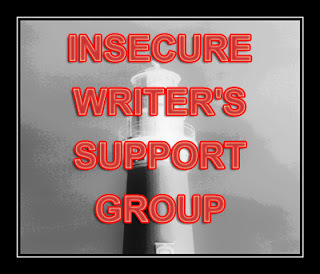
Welcome, Insecure Writers! If you haven't yet joined this amazing group, clicky clicky here. You'll be glad you did.
There comes a time in our writing journeys when we must ask this question: What do I want?
Do I want to become a bestseller?
Do I want awards?
Do I want a devoted fan base?
Do I simply want to be read?
Do I want to write in solitude and relinquish publishing?
Once we've answered the "What do I want?" question, we can then ask: How do I get there?
Do I go the traditional path?
Do I sign with an agent?
Do I sign with a small publisher?
Do I go indie?
Do I write, but keep the words to myself?
Sometimes knowing what you want, and knowing how to get there, are half the battle. I struggled with the What do I want? question for a long time before leaping into indie publishing.
Our paths are twisted, bumpy, and sometimes hazardous, but they're our own.Do you know what you want? Have you decided how you'll get there? Please share!
Published on April 01, 2015 04:00
March 25, 2015
Our Number One Fear in Life
 (photo credit)
(photo credit)I read an interesting article in Oprah Magazine. Dr. Phil wrote a piece on how we humans share one of the biggest fears in life: the fear of rejection.
He wrote that we all long to be accepted, and "We are at the pinnacle of life when we feel involved in the world, whether that means being part of a couple, a family, or a group of friends or colleagues. We want to belong."
Before I took writing seriously, I never really thought about the fear of rejection. But it was there. Fear of going on that job interview, knowing there was a possibility they'd choose someone else. Fear of submitting that offer on a piece of property, knowing the seller might laugh at our numbers. Even way back in high school, I remember that fear of walking up to a group, hoping they'd include me. (Heck, I still feel that fear in social situations)
But now? As a writer? Fear of rejection is ingrained into my daily life. It would be so nice if everything we wrote was loved by everyone. But no matter where we are in our publishing journeys, we'll always feel the fear of rejection.
The new author fears she doesn't have what it takes. She fears her skills will never be good enough.The agented author fears her agent will not be able to sell her work. She fears that all the hard work to snag the agent was for naught.The indie author fears her work will disappear among the digital shelves. She fears the gatekeepers were right.The debut author fears her sparkling new book will fall flat. She fears low sales will stall a budding career.The experienced, bestselling author fears she was a one hit or two hit wonder. She fears she'll never unearth that magic again.Dr. Phil pointed out that successful people around the globe still fear rejection, but they don't let it hold them back. They take baby steps forward or leap with their eyes closed, despite that fear of rejection.
That's what I struggle with every single day. Feeling that fear of rejection, yet taking that leap anyway.
How about you, writers? Do you let the fear of rejection hold you back? Or do you take giant leaps anyway? Please share!
Published on March 25, 2015 04:00
March 18, 2015
Lacking Confidence?
 (photo credit)
(photo credit)I'm in the final stages of prepping my manuscript to be beta read by my trusted writing buddies. My friends know the basic premise of the story, because they've helped me with the query. But the actual manuscript has not been seen by anyone but me.
Guess what I'm lacking? Confidence.
You know that feeling, right? That feeling of fear just before you send that newborn story to have it critiqued. It's a scary step in the publishing process--but absolutely necessary.
*Deep breaths*
When I'm feeling insecure, I like to search for inspiration. Here are some share-worthy quotes about confidence:
No one can make you feel inferior without your consent. --Eleanor Roosevelt
It's not who you are that holds you back, it's who you think you're not. --Attributed to Hanoch McCarty
We have to learn to be our own best friends, because we fall too easily into the trap of being our own worst enemies. --Roderick Thorp, Rainbow Drive
It ain't what they call you, it's what you answer to. --W.C. Fields
Whether you think you can or think you can't, you are right. --Henry Ford
I quit being afraid when my first venture failed and the sky didn't fall down. --Allen H. Neuharth
If you hear a voice within you say "you cannot paint," then by all means paint, and that voice will be silenced. --Vincent Van Gogh
Don't live down to expectations. Go out there and do something remarkable. --Wendy Wasserstein
A great deal of talent is lost to the world for want of a little courage. Every day sends to their graves obscure men whose timidity prevented them from making a first effort. --Sydney Smith
Friends, do you suffer from lack of confidence when someone else reads your work? Does fear prevent you from sending it out? Did these quotes give you the confidence to send it out anyway? Please share!
Published on March 18, 2015 04:00
March 11, 2015
Crutch Words that Weaken Our Prose
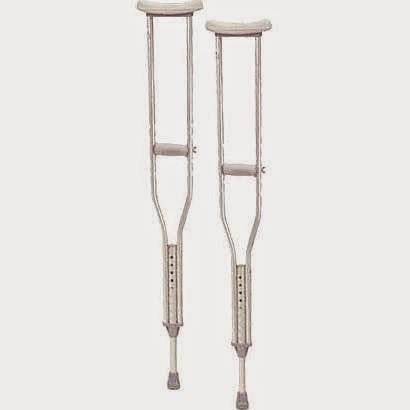
Are there certain words that you use too much? When you Wordle, does suddenly suddenly appear huge and dead center?
We all have our crutch words. The dictionary describes a crutch as "a thing used for support or reassurance." For me, crutch words are the easiest to find in my vocabulary when I'm writing a first draft. Nothing wrong with that.
But as we progress through drafts, we should trim as many crutch words as possible. I have a running list of words that weaken my writing. It's not that these words are never okay, it's just that they sometimes add unnecessary fat, and can usually be replaced with stronger words. When I run a search for these words, I spot areas in the manuscript that need tightening or clarification.
Here's a list that I've compiled, using multiple sources:
about
actually
almost
approximately
barely
basically
beginning
believe/believed
completely
down
eventually
feel/feeling/felt
however
imagine/imagined
just
kind of
knew/know
little
look/looked
mostly
much
nearly
only
practically
pretty
rather
realize/realized
really
remember/remembered
saw/see
seem/seemed
slightly
somewhat
sort of
stuff
suddenly
thing
think/thought
tried
understand
I usually weed out crutch words after beta reads, but before the professional edit. This time around, I'm doing it before the beta reads. That way my trusted readers don't have to suffer through reading "look" three times in the same paragraph.
Tell me, writers, what are your crutch words? Any I need to add to my list? At what point in the process do you search for weak words? Please share!
Published on March 11, 2015 04:00
March 4, 2015
Chasing Perfection #IWSG
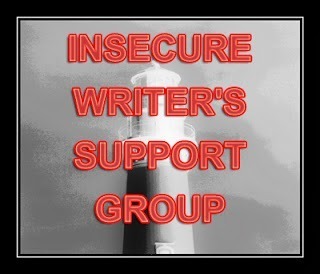
Welcome, Insecure Writers! If you haven't yet joined this amazing group, what are you waiting for? Click here to sign up.
I recently heard a message about expecting perfection. Perhaps we strive for the perfect Christmas, with flawless family photos and a Martha-Stewart-worthy table setting. Or maybe it's the perfect garden (*sigh*-- hubby and I are unintentional tree killers), or even the perfect hair day (*snort* -- don't get me started).
As writers, we're often searching for the perfect word. And when we find it? Euphoria. It's so worth the effort.
I think chasing perfection is a good thing, as long as it doesn't stop forward movement. Searching for the perfect word is great, as long as it doesn't prevent us from writing the next word, and then the next paragraph. And when editing an entire manuscript, I think chasing perfection works in our favor, as long as the fear of imperfection doesn't paralyze us.
I recently read a brand new book. It was traditionally published by a big house, and hot off the presses. Guess what? I found two typos. No matter how many eyes scanned that book, and no matter how skilled the editors were, the book was not perfect. No book ever will be.
So here's my attitude: chase perfection, but don't be stymied by it. Realize that no matter what, it will never, ever, EVER be perfect. We can't catch something that doesn't exist.
What's your view on chasing perfection? Are you sometimes paralyzed by fear of imperfection? How do you handle it?
Published on March 04, 2015 04:00
February 25, 2015
Perseverance and Conquering Fears: Lisa Gail Green's Journey to Publication
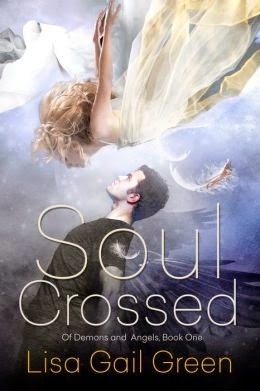
Guys, today I'm totally excited to have Lisa Gail Green here! She's one of my closest writing buddies and beta readers, and I'm so proud to announce the release of her YA novel, Soul Crossed. I've read Soul Crossed. It's amazing, and creepy, and thrilling. Check out this summary...
Josh lived a reckless, selfish life, so upon his death, escaping the eternal torments of Hell by assuming the role of a powerful, soul-corrupting demon is an easy choice. His first soul assignment doesn't seem too hard: the mortal Camden is already obsessed with weapons, pain, and torture. If only Josh wasn't distracted by Cam's beautiful friend, Grace.
Grace never expected to die violently at age sixteen, but now she's an Angel, responsible for saving a soul. She can already see past Camden's earthly flaws, so the job should be easy. If only that handsome, playboy Josh would stop getting in the way.
It's forbidden for an Angel to be with a Demon, so if Josh and Grace stop resisting each other, the results would be disastrous.
So, how did Lisa go from Super Mom to Super Mom plus published author? Let's find out!
Julie: Your YA novel “Soul Crossed” releases today (yay!). Can you tell us a bit about how you came up with the story idea? How much has it changed throughout revisions?
Lisa: Squeeeeeeee! Sorry had to get that out first. *ahem* The story started because I wanted a forbidden romance, so I thought, ‘what is the worst situation I can put my characters in?’ You can’t get much worse than an Angel and a Demon falling in love. Those are the kind of problems that I think make a good books. The rest kind of fell into place from there. In fact, one of my characters (I’m looking at you, Josh) did something I wasn’t expecting, which kind of saved the rest of the book for me plot wise. I love it when that happens!
Julie: You’ve persevered through a change in literary agents, and your publishing journey has definitely been a long and winding road. Can you give us a brief summary of your path?
Lisa: Hahaha! Yes, like many other authors I know I have changed agents. However, my current agent, Melissa Nasson works with my previous agent, Rubin Pfeffer! I have nothing against Rubin - he’s an awesome guy. We just didn’t make the best match for several reasons, things like my need/desire for an editorial agent and the type of books I write. I can say that it’s been quite the emotional roller coaster since I started though! And it continues to be. :D But now I embrace that. I love that you never know what’s coming and take delight in all the “small” accomplishments along the way, whether a kind tweet from someone or a nice review. I love seeing that my work made readers feel. That’s what it’s all about in the end, right?
But you wanted a summary of my path so here goes: Start writing with no clue, made the usual mistakes like querying before I was ready, joined SCBWI and learned as much as humanly possible about the industry, read, met great people like Julie Musil, read more, got an offer from Rubin and hit the ceiling/walked on air for several days straight (maybe weeks), started blogging and Twitter, met more awesome people, read more, went on submission, started getting rejections, got close, got more rejections, read, separated from agent, read, had a baby (#3 much younger than my others), was diagnosed with Rheumatoid Arthritis and almost quit and — got a good doctor, got an offer from Melissa and THE OFFER from Samantha at FFF!!! Whew. Does that sum it up??
Julie: Soul Crossed was published by Full Fathom Five Digital. Can you tell us a bit about your experience with a digital only publisher?
Lisa: They’ve been AMAZING. I can’t stress enough how happy I am. They’ve made me one of their lead titles and have not skimped on the marketing, which any published author can tell you is beyond incredible. It’s all been electronic, but pretty much the same process as with any other publisher. I did edits with my awesome editor, then line edits, then copy edits with the copy editor, looked over the ARC, etc. I also love the particular way they handle the relationship contractually, but I won’t go into all that here. AND here’s the kicker — with FFF, since they have many arms, there are possibilities for more and in fact, we are doing a print version as well. I just don’t know the date of release yet. OH and one really cool thing with the digital publisher? They move so much faster than traditional ones. My sequel is due out July 1st!
Julie: What writing advice has resonated with you the most, and why?
Lisa: It has always been and continues to be: Write what scares you, which I first heard from my hero, Libba Bray. It hit me like an anvil. I had to keep improving and moving forward and the best way to do that, to challenge yourself and keep it fresh, is to go where you’re uncomfortable going. You can always revise later.
Julie: If there’s an author out there who’s doubting their writing abilities and is ready to throw in the towel, what “flick to the forehead” advice would you give them?
Lisa: Don’t do it!! If you quit, it is 100% certain it will never happen. If you keep trying, there’s always that chance. Also, that chance improves exponentially the more you improve your craft and continue writing. Look at me! I was about to finally give in, despite my habit of always encouraging others to never do that same and then IT happened. :D
Cool, right? Lisa, thanks so much for sharing your experience. We wish you the very best with your new series!
Friends, has your writing journey been a long and winding road? What's the best piece of writing advice you've ever received? Please share!
Lisa Gail Green lives with her husband the rocket scientist and their three junior mad scientists in Southern California. She writes books so she can have an excuse to live in the fantasy world in her head. She likes to share these with readers so she's represented by the lovely Melissa Nasson of Rubin Pfeffer Content. She has a parrot but would most definitely get a werewolf for a pet if she weren't allergic.
a Rafflecopter giveaway
Published on February 25, 2015 04:00

